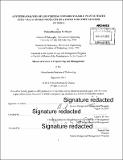| dc.contributor.advisor | Charles H. Fine. | en_US |
| dc.contributor.author | Desam, Padmabhushana R | en_US |
| dc.contributor.other | System Design and Management Program. | en_US |
| dc.coverage.spatial | a-ii--- | en_US |
| dc.date.accessioned | 2015-12-16T16:34:14Z | |
| dc.date.available | 2015-12-16T16:34:14Z | |
| dc.date.copyright | 2013 | en_US |
| dc.date.issued | 2013 | en_US |
| dc.identifier.uri | http://hdl.handle.net/1721.1/100360 | |
| dc.description | Thesis: S.M. in Engineering and Management, Massachusetts Institute of Technology, Engineering Systems Division, System Design and Management Program, 2013. | en_US |
| dc.description | Cataloged from PDF version of thesis. | en_US |
| dc.description | Includes bibliographical references (pages 59-61). | en_US |
| dc.description.abstract | Waste plastic, both industrial and municipal sources, is posing a major environmental challenges in developing countries such as India due to improper disposal methods. Large quantities of non-recyclable plastic waste get collected in paper recycling plants in Muzaffamagar and other regions in India. The plastic waste is typically in the form of protective covers, thin film, binding coils etc., which gets separated from paper during the pulping process. Because of its low value in recycling markets, the plastic waste is currently being burned as a substitute fuel for biomass in meeting the steam generation needs in paper production. Though incineration of plastic along with other solid waste for energy recovery is a common practice in countries like Europe, low technology employed in grate boilers without proper environmental equipment are creating serious problems in this region due to combustion-generated pollution. Instead, pyrolysis technologies in combination with innovative catalysts are evolving in recent years for converting waste plastic into fuel oil, diesel, and LPG. These technologies are proven to be safe and environmental-friendly, while producing value-added products that are in high demand. The primary objective of this research study is to investigate suitable technologies to convert waste plastic that is generated in the Muzaffarnagar paper cluster into value-added products, while considering certain unique requirements such as the ability to handle large quantities of mixed plastic, availability of biomass heating sources, lack of skilled workers, and limited capital and operating costs that play an important role in new technology adoption. Moreover, implementation of a suitable technology subject to economic and social considerations in this region is explored at a system-level. This systems thinking approach is deemed to be suitable for handling such complex problems, where non-technical issues play a crucial role in finding an appropriate solution. | en_US |
| dc.description.statementofresponsibility | by Padmabhushana R. Desam. | en_US |
| dc.format.extent | 63 pages | en_US |
| dc.language.iso | eng | en_US |
| dc.publisher | Massachusetts Institute of Technology | en_US |
| dc.rights | M.I.T. theses are protected by copyright. They may be viewed from this source for any purpose, but reproduction or distribution in any format is prohibited without written permission. See provided URL for inquiries about permission. | en_US |
| dc.rights.uri | http://dspace.mit.edu/handle/1721.1/7582 | en_US |
| dc.subject | Engineering Systems Division. | en_US |
| dc.subject | System Design and Management Program. | en_US |
| dc.title | A system analysis of converting non-recyclable plastic waste into value-added products in a paper industry cluster | en_US |
| dc.type | Thesis | en_US |
| dc.description.degree | S.M. in Engineering and Management | en_US |
| dc.contributor.department | System Design and Management Program. | en_US |
| dc.contributor.department | Massachusetts Institute of Technology. Engineering Systems Division | |
| dc.identifier.oclc | 931091117 | en_US |
